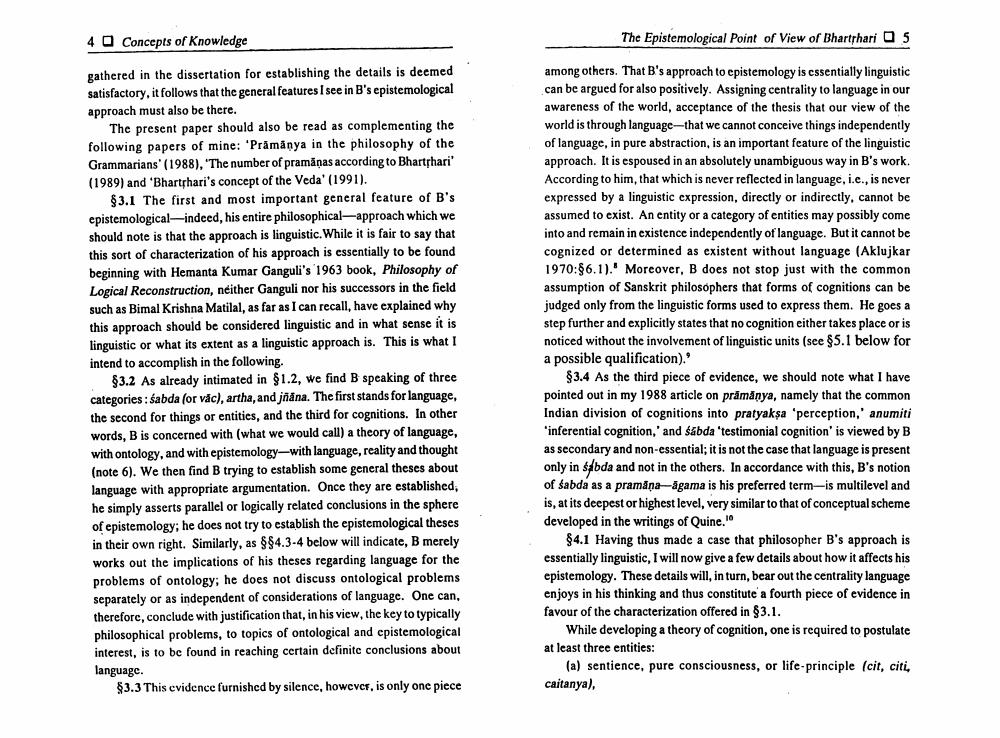Book Title: Epistemological Point Of View Of Bhartrhari Author(s): Ashok Aklujkar Publisher: Ashok Aklujkar View full book textPage 3
________________ 4 Concepts of Knowledge The Epistemological Point of View of Bhartrhari a 5 gathered in the dissertation for establishing the details is deemed satisfactory, it follows that the general features I see in B's epistemological approach must also be there. The present paper should also be read as complementing the following papers of mine: 'Pramanya in the philosophy of the Grammarians' (1988), 'The number of pramānas according to Bharthari (1989) and 'Bharthari's concept of the Veda' (1991). $3.1 The first and most important general feature of B's epistemological-indeed, his entire philosophical approach which we should note is that the approach is linguistic. While it is fair to say that this sort of characterization of his approach is essentially to be found beginning with Hemanta Kumar Ganguli's 1963 book, Philosophy of Logical Reconstruction, neither Ganguli nor his successors in the field such as Bimal Krishna Matilal, as far as I can recall, have explained why this approach should be considered linguistic and in what sense it is linguistic or what its extent as a linguistic approach is. This is what I intend to accomplish in the following. $3.2 As already intimated in $1.2, we find B speaking of three categories: šabda for vac), artha, and jnana. The first stands for language, the second for things or entities, and the third for cognitions. In other words, B is concerned with (what we would call) a theory of language, with ontology, and with epistemology-with language, reality and thought (note 6). We then find B trying to establish some general theses about language with appropriate argumentation. Once they are established, he simply asserts parallel or logically related conclusions in the sphere of epistemology; he does not try to establish the epistemological theses in their own right. Similarly, as $84.3-4 below will indicate, B merely works out the implications of his theses regarding language for the problems of ontology; he does not discuss ontological problems separately or as independent of considerations of language. One can, therefore, conclude with justification that, in his view, the key to typically philosophical problems, to topics of ontological and epistemological interest, is to be found in reaching certain definite conclusions about language. $3.3 This evidence furnished by silence, however, is only one piece among others. That B's approach to epistemology is cssentially linguistic can be argued for also positively. Assigning centrality to language in our awareness of the world, acceptance of the thesis that our view of the world is through language--that we cannot conceive things independently of language, in pure abstraction, is an important feature of the linguistic approach. It is espoused in an absolutely unambiguous way in B's work. According to him, that which is never reflected in language, i.e., is never expressed by a linguistic expression, directly or indirectly, cannot be assumed to exist. An entity or a category of entities may possibly come into and remain in existence independently of language. But it cannot be cognized or determined as existent without language (Aklujkar 1970:36.1). Moreover, B does not stop just with the common assumption of Sanskrit philosophers that forms of cognitions can be judged only from the linguistic forms used to express them. He goes a step further and explicitly states that no cognition either takes place or is noticed without the involvement of linguistic units (see $5.1 below for a possible qualification). $3.4 As the third piece of evidence, we should note what I have pointed out in my 1988 article on pramanya, namely that the common Indian division of cognitions into pratyaksa 'perception,' anumiti 'inferential cognition,' and sabda 'testimonial cognition' is viewed by B as secondary and non-essential; it is not the case that language is present only in bda and not in the others. In accordance with this, B's notion of sabda as a pramana-agama is his preferred term-is multilevel and is, at its deepest or highest level, very similar to that of conceptual scheme developed in the writings of Quine. $4.1 Having thus made a case that philosopher B's approach is essentially linguistic, I will now give a few details about how it affects his epistemology. These details will, in turn, bear out the centrality language enjoys in his thinking and thus constitute a fourth piece of evidence in favour of the characterization offered in 83.1. While developing a theory of cognition, one is required to postulate at least three entities: (a) sentience, pure consciousness, or life-principle (cit, citi, caitanya),Page Navigation
1 2 3 4 5 6 7 8 9 10
